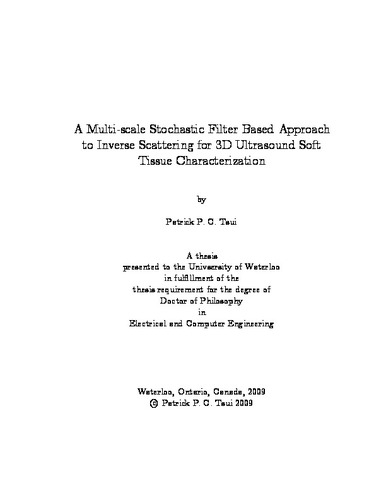| dc.contributor.author | Tsui, Patrick Pak Chuen | |
| dc.date.accessioned | 2009-10-30 18:25:18 (GMT) | |
| dc.date.available | 2009-10-30 18:25:18 (GMT) | |
| dc.date.issued | 2009-10-30T18:25:18Z | |
| dc.date.submitted | 2009 | |
| dc.identifier.uri | http://hdl.handle.net/10012/4839 | |
| dc.description.abstract | The goal of this research is to achieve accurate characterization of multi-layered soft tissues in three dimensions using focused ultrasound. The characterization of the acoustic parameters of each tissue layer is formulated as recursive processes of forward- and inverse- scattering.
Forward scattering deals with the modeling of focused ultrasound wave propagation in multi-layered tissues, and the computation of the focused wave amplitudes in the tissues based on the acoustic parameters of the tissue as generated by inverse scattering. The model for mapping the tissue acoustic parameters to focused waves is highly nonlinear and stochastic. In addition, solving (or inverting) the model to obtain tissue acoustic parameters is an ill-posed problem. Therefore, a nonlinear stochastic inverse scattering method is proposed such that no linearization and mathematical inversion of the model are required.
Inverse scattering aims to estimate the tissue acoustic parameters based on the forward scattering model and ultrasound measurements of the tissues. A multi-scale stochastic filter (MSF) is proposed to perform inverse scattering. MSF generates a set of tissue acoustic parameters, which are then mapped into focused wave amplitudes in the multi-layered tissues by forward scattering. The tissue acoustic parameters are weighted by comparing their focused wave amplitudes to the actual ultrasound measurements. The weighted parameters are used to estimate a weighted Gaussian mixture as the posterior probability density function (PDF) of the parameters. This PDF is optimized to achieve minimum estimation error variance in the sense of the posterior Cramer-Rao bound. The optimized posterior PDF is used to produce minimum mean-square-error estimates of the tissue acoustic parameters. As a result, both the estimation error and uncertainty of the parameters are minimized.
PDF optimization is formulated based on a novel multi-scale PDF analysis framework. This framework is founded based on exploiting the analogy between PDFs and analog (or digital) signals. PDFs and signals are similar in the sense that they represent characteristics of variables in their respective domains, except that there are constraints imposed on PDFs. Therefore, it is reasonable to consider a PDF as a signal that is subject to amplitude constraints, and as such apply signal processing techniques to analyze the PDF.
The multi-scale PDF analysis framework is proposed to recursively decompose an arbitrary PDF from its fine to coarse scales. The recursive decompositions are designed so as to ensure that requirements such as PDF constraints, zero-phase shift and non-creation of artifacts are satisfied. The relationship between the PDFs at consecutive scales is derived in order for the PDF optimization process to recursively reconstruct the posterior PDF from its coarse to fine scales. At each scale, PDF reconstruction aims to reduce the variances of the posterior PDF Gaussian components, and as a result the confidence in the estimate is increased. The overall posterior PDF variance reduction is guided by the posterior Cramer-Rao bound.
A series of experiments is conducted to investigate the performance of the proposed method on ultrasound multi-layered soft tissue characterization. Multi-layered tissue phantoms that emulate ocular components of the eye are fabricated as test subjects. Experimental results confirm that the proposed MSF inverse scattering approach is well suited for three-dimensional ultrasound tissue characterization. In addition, performance comparisons between MSF and a state-of-the-art nonlinear stochastic filter are conducted. Results show that MSF is more accurate and less computational intensive than the state-of-the-art filter. | en |
| dc.language.iso | en | en |
| dc.publisher | University of Waterloo | en |
| dc.subject | inverse scattering | en |
| dc.subject | tissue characterization | en |
| dc.subject | multi-scale stochastic filtering | en |
| dc.subject | ultrasound | en |
| dc.title | A Multi-scale Stochastic Filter Based Approach to Inverse Scattering for 3D Ultrasound Soft Tissue Characterization | en |
| dc.type | Doctoral Thesis | en |
| dc.pending | false | en |
| dc.subject.program | Electrical and Computer Engineering | en |
| uws-etd.degree.department | Electrical and Computer Engineering | en |
| uws-etd.degree | Doctor of Philosophy | en |
| uws.typeOfResource | Text | en |
| uws.peerReviewStatus | Unreviewed | en |
| uws.scholarLevel | Graduate | en |

